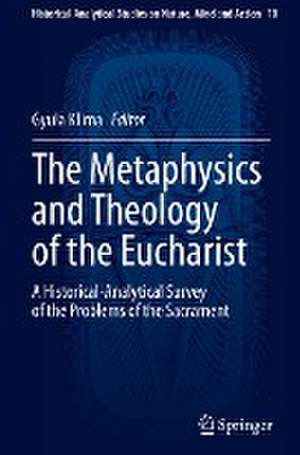The Metaphysics and Theology of the Eucharist: A Historical-Analytical Survey of the Problems of the Sacrament: Historical-Analytical Studies on Nature, Mind and Action, cartea 10
Editat de Gyula Klimaen Limba Engleză Hardback – 2 ian 2024
Preț: 796.13 lei
Preț vechi: 970.89 lei
-18% Nou
Puncte Express: 1194
Preț estimativ în valută:
152.36€ • 165.44$ • 127.98£
152.36€ • 165.44$ • 127.98£
Carte tipărită la comandă
Livrare economică 22 aprilie-06 mai
Preluare comenzi: 021 569.72.76
Specificații
ISBN-13: 9783031402494
ISBN-10: 3031402499
Pagini: 462
Ilustrații: XVIII, 462 p. 1 illus.
Dimensiuni: 155 x 235 mm
Greutate: 0.85 kg
Ediția:1st ed. 2023
Editura: Springer International Publishing
Colecția Springer
Seria Historical-Analytical Studies on Nature, Mind and Action
Locul publicării:Cham, Switzerland
ISBN-10: 3031402499
Pagini: 462
Ilustrații: XVIII, 462 p. 1 illus.
Dimensiuni: 155 x 235 mm
Greutate: 0.85 kg
Ediția:1st ed. 2023
Editura: Springer International Publishing
Colecția Springer
Seria Historical-Analytical Studies on Nature, Mind and Action
Locul publicării:Cham, Switzerland
Cuprins
Chapter 1. Foreword: Should we discuss matters of faith, and if so, how? (Klima).- Chapter 2. Introduction: The Semantics, Metaphysics and Theology of the Eucharist (Klima).- Chapter 3. The Three Sacraments of Pseudo-Dionysius (Baptism, Eucharist, Holy Unction) and their subsequent transformations in Christian theology (Perczel).- Chapter 4. Azyma and Epiclesis: Two Eucharistic Differences between Greeks and Latins (Geréby).- Chapter 5. The Armenian Metaphysics of the Sacrifice (Contin).- Chapter 6. The impossibility of transubstantiation and the philosophical representation of religion in the 1260s and 70s (Borbély).- Chapter 7. Accidens secundum species: Bonaventure’s solution to the problem of the accident sine subiecto (Afonso).- Chapter 8. The Body of Christ in Aquinas's Quodlibetal Questions (Nevitt).- Chapter 9.Whether definitions can contain esse: The problem of subsistent accidents in the Eucharist (Twetten).- Chapter 10. “Real Presence” is Not Enough: Recovering the Lost Semantics of Transubstantiation (Hochschild).- Chapter 11. Scotus on Inherence and the Eucharist (Cross).- Chapter 12.Schuman, Boaz: John Buridan on the Eucharist.- Chapter 13. Transubstantiation and real distinction between essence and existence? The concerns of Benedict Pereira SJ (1536 – 1610) (Ventimiglia).- Chapter 14. Quotation and Consecration: Question 10 of Pico's Apology (Crimi).- Chapter 15. Substantiation: Trans and Con (Normore).- Chapter 16. Semantics versus Metaphysics in the Lutheran Scholastic Rejection of Transubstantiation (Hahn).- Chapter 17. Rejecting Transubstantiation in Late Medieval England and Bohemia (Levy).- Chapter 18. Real Presence and the Problem of Revisionist Ontology in Descartes's Account of Eucharist (Schmal).- Chapter 19. Do We Eat Christ When We Eat Accidents? A Single-Subject Eucharistic Theology (McCullough).- Chapter 20.A Second-Person Perspective on the Eucharist (Pinsent).
Notă biografică
Gyula Klima is Professor of Philosophy at Fordham University, and Director of the Research Center for the History of Ideas of the Institute of Hungarian research. He is also the founding director of the Society for Medieval Logic and Metaphysics and of the Society for the European History of Ideas. His publications include Questions on the Soul by John Buridan and Others (Springer, 2017), Intentionality, Cognition and Mental Representation in Medieval Philosophy (Fordham University Press, 2015), John Buridan (Oxford University Press, 2008), John Buridan: Summulae de Dialectica, an annotated translation with a philosophical introduction; (Yale University Press, 2001); ARS ARTIUM: Essays in Philosophical Semantics, Medieval and Modern (Institute of Philosophy of the Hungarian Academy of Sciences, 1988).
Textul de pe ultima copertă
This volume is about the most mind-boggling sacrament of the Christian faith, also referred to as the Sacrament of the Altar, the Eucharist: in its Roman Catholic interpretation, the conversion of the substance of the bread and wine into the body and blood of Christ for Holy Communion. The challenge of providing a rational interpretation of this doctrine of faith proved to be one of the most contentious issues in the Western history of ideas, apparently going against self-evident metaphysical principles (requiring accidents existing without a substance, and a body in several places at the same time, etc.), and dividing schools of thought, indeed, eventually, warring religious factions. The volume addresses both the metaphysical, theoretical issues involved in this challenge and the historical, theological developments of how meeting this challenge played out first in the schools and even later in religious schisms, leading to the paradigmatic shift from medieval to modern forms of thought. The essays of the volume derive from the lectures of an eponymous international conference held in Budapest, Hungary, which was also the occasion of founding the Society for the History of European Ideas (SEHI); accordingly, the book is the first volume of the annual Proceedings of the SEHI. This book is aimed just as much at laymen and religious scholars seeking a better understanding of their faith as at anyone seeking this understanding with a non-religious attitude.
Caracteristici
The essays provide a unique historical-analytical survey concerned with the problems stemming from the sacrament The volume covers preeminent historical theological approaches to the problems from the beginnings to our times The essays uncover the various semantical and metaphysical presumptions from the main historical authorities













